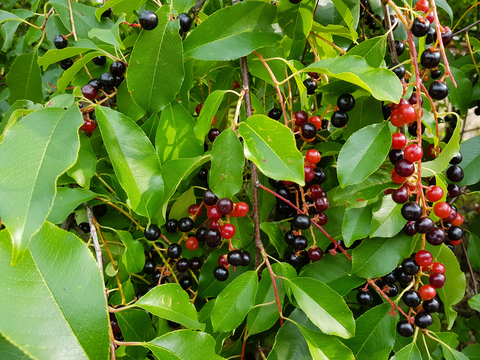Wild Cherry Bark
Also known as
Prunus serotina, Black Cherry (Prunus virginiana), Virginian Prune, and Choke Cherry.
Introduction
From ancient times the cherry has been associated with virginity, the red colored fruit with the enclosed seed symbolizing the uterus. Buddhism teaches that Maya, the virgin mother of Buddha, was supported by a holy cherry tree during her pregnancy. In Danish folklore, a good crop of cherries was insured by having the first ripe fruit eaten by a woman shortly after her first child was born. Many myths used cherries as symbols of both education and concealment. The cherry has been associated with virginity from ancient times to modern, which probably arose from the red colored fruit with enclosed seed symbolizing the uterus.
Constituents
Acetylcholine, HCN, kaempferol, p-coumaric acid, prunasin, quercetin, scopoletin, tannins.
Parts Used
Dried bark.
Typical Preparations
Most commonly found in Syrup formulas, however it may be administered as a tea or extract.
Summary
Much of the healing activity of wild cherry bark is associated with scopoletin: analgesic, antiarrhythmic, antibacterial, anticonstrictive (in the bronchial tubes), antihepatotoxic, anti-inflammatory, fungicide, lowering blood pressure, lowering blood sugars, relaxing the muscles, "sedating" the uterus. The bark is also about 1/2% hydrogen cyanide, just enough to stop coughing and to relax the bronchial tubes without having any other physiological effects.
Precautions
All stone fruits (cherries, apples, apricots, peaches, plums, pears) contain very low levels of hydrogen cyanide in their bark and pits. The concentration is low enough to be considered therapeutic, but don't take the whole bottle all at once! Not recommended for small children, nursing mothers, pregnant women, or people with severe kidney or liver disease. Not recommended for long term use.
PURCHASE WILD CHERRY BARK EXTRACT
For educational purposes only. This information has not been evaluated by the Food and Drug Administration. This information is not intended to diagnose, treat, cure, or prevent any disease.
Unless otherwise stated, this information courtesy of MOUNTAIN ROSE HERBS, with full, written permission for reuse. For further traditional information concerning WILD CHERRY BARK, please visit this excellent resource fromBotanical.com. Used with full, written permission.







